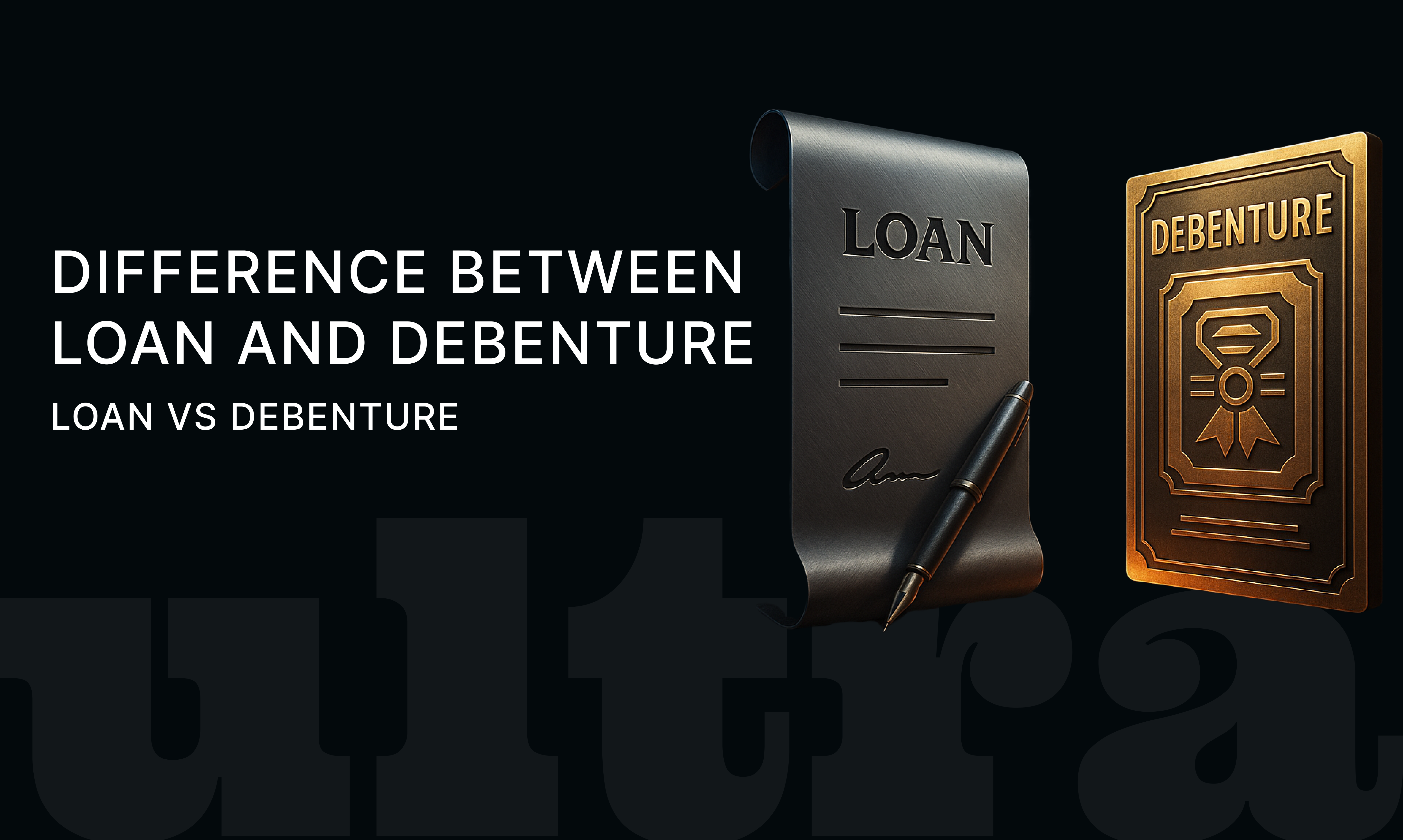Difference Between Loan and Debenture: What You Need to Know
14 July 2025 · Sachin Gadekar
How Loans and Debentures Differ: Meaning, Features, and Which One Is Better.

Introduction
In the world of finance, terms like loan and debenture are used frequently. But if you are an investor or a business owner, knowing the difference between loan and debenture is crucial. These are two distinct ways companies raise funds — each with unique features, advantages, and implications.
At Ultra, we help investors understand debt instruments so they can make informed investment choices. In this guide, you’ll learn:
What is a loan?
What is a debenture?
The main difference between loan and debenture.
Difference between bond and debenture.
How businesses use loans vs debentures.
Pros and cons for companies and investors.
What is a Loan?
A loan is a financial agreement in which a lender (like a bank) provides a borrower with a fixed sum of money for a specific period at an agreed interest rate. The borrower repays the principal amount along with interest in instalments or as a lump sum.
Features of Loans:
Typically secured by collateral.
Provided by banks, NBFCs or financial institutions.
Fixed repayment schedule.
Strict terms and conditions.
Interest rates may be fixed or floating.
Example: A business takes a ₹50 lakh bank loan to buy machinery. It repays this amount over five years with interest.
What is a Debenture?
A debenture is a long-term debt instrument issued by a company to raise funds from the public or institutional investors. Unlike loans, debentures are usually unsecured — they are backed only by the company’s creditworthiness.
Features of Debentures:
Can be secured or unsecured.
No collateral needed (in case of unsecured).
Fixed interest paid to debenture holders.
Tradable on the market.
Used for medium to long-term funding.
Example: A company issues ₹10 crore in debentures at 8% annual interest to raise working capital without approaching a bank.
Difference Between Loan and Debenture in Banking
| Aspect | Loan | Debenture |
|---|---|---|
| Definition | Borrowing from a bank or financial institution. | Debt instrument issued to investors/public. |
| Security | Usually secured by collateral. | Often unsecured; secured debentures exist too. |
| Tradability | Not tradable. | Can be traded in the debt market. |
| Repayment | Fixed EMIs or lumpsum. | Interest paid periodically; principal repaid at maturity. |
| Interest Rate | May vary based on borrower’s profile. | Fixed interest, decided at issuance. |
| Control | Direct negotiation with lender. | Raised through public or private placement. |
| Obligation | Loan covenants may restrict business decisions. | Fewer operational restrictions. |
| Voting Rights | Lenders have no ownership. | Debenture holders are creditors, not owners. |
Loans vs Debentures: Which is Better for Companies?
Loans:
Better for short-term or asset-specific needs
Easier to arrange with a banking relationship.
Comes with collateral and restrictive terms. Debentures:
Ideal for medium to long-term capital needs.
No dilution of ownership.
Flexible usage of funds.
May carry higher interest than secured loans.
Why Should Investors Know the Difference?
As an investor, understanding the difference between bond and debenture, and the difference between loan and debenture in banking helps you:
Evaluate risk.
Diversify your fixed-income investments.
Pick between secured vs unsecured returns.
Plan tax implications.
If you hold a company’s debentures, you become its creditor, entitled to fixed interest but with no ownership. This can provide steady income but carries default risk if the company’s finances weaken.
Practical Example
Let’s say ABC Ltd. needs ₹20 crore:
It can borrow ₹20 crore from a bank as a term loan secured against assets. The company pays interest + principal as EMIs.
Or, it can issue debentures worth ₹20 crore at 9% annual interest, repayable in 5 years. Investors receive interest annually and principal at the end.
FAQs on Difference Between Loan and Debenture
1. What is the main difference between loan and debenture?
A loan is borrowed from a lender, often secured by collateral, while a debenture is an unsecured debt instrument issued by a company to raise funds from investors.
2. Are debentures safer than loans?
For the company, loans are often safer as they provide structured repayment. For investors, secured loans have lower risk than unsecured debentures.
3. Can a company issue both loans and debentures?
Yes, companies often use a mix of bank loans and debentures to manage capital needs.
4. Is a debenture the same as a bond?
No, bonds are generally secured by specific assets, while debentures are often unsecured and depend on the issuer’s creditworthiness.
5. Which is better for investors: debenture or loan?
Retail investors don’t give loans directly to companies — they invest in debentures or bonds for regular income. The risk-return profile depends on whether the instrument is secured or unsecured.
Final Thoughts
Both loans and debentures are essential ways for businesses to access funds, but they work differently. Loans come from banks with security and strict terms. Debentures allow companies to raise money directly from the market without collateral.
Understanding the difference between loan and debenture helps you make better choices as an investor or business owner.